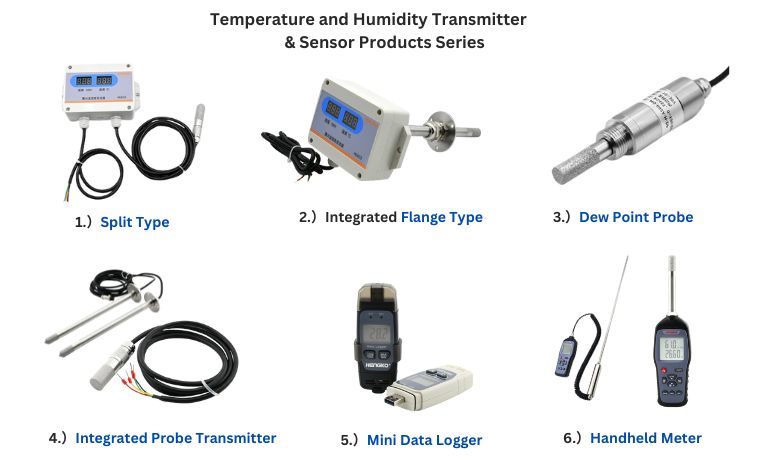-
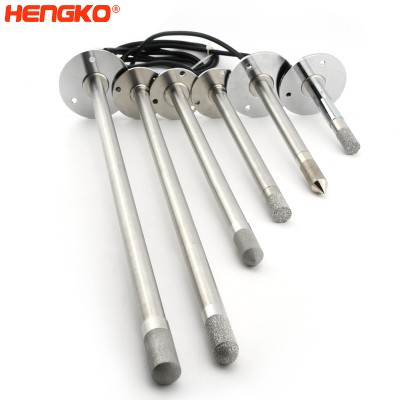
HENGKO sintered metal temperature and humidity sensor probe for grain blower
HENGKO temperature and humidity sensors can be applied in various fields: telepoint base stations, electronic control cabinets, production sites, storehouses...
View Detail -
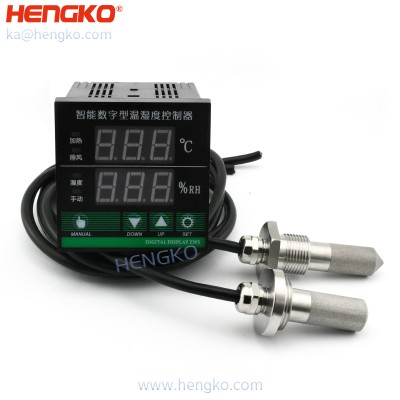
RS485 digital RHT temperature and humidity controller with sensor for eggs incubator HT705
HENGKO temperature humidity incubator controller designed using the latest high-speed microcontroller. It is widely applied in incubator box temperature cont...
View Detail -
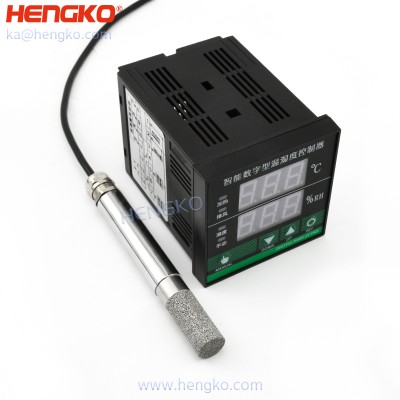
temperature and humidity controller with sensor which bear high temperature used for Eg...
digital temperature and humidity controller with humidity probe which bears high-temperature used for Egg Incubator, 0-99.9%RH HENGKO digital temperat...
View Detail -
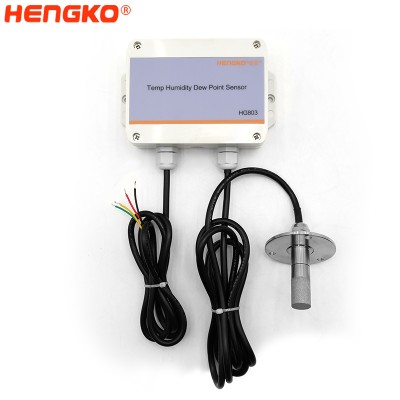
Temperature and Humidity Monitor for IoT Applications HG803 Humidity Sensor
Product Describe HG803 Series Temperature and Humidity Monitor has been designed to measure, monitor and record temperature and humidity. It is a perfect so...
View Detail -

IoT Humidity Sensor in Cold Chain Storage
Every year billion tons of goods are wasted because of temperature variations. A small drop or increase in temperature can reduce shelf li...
View Detail -
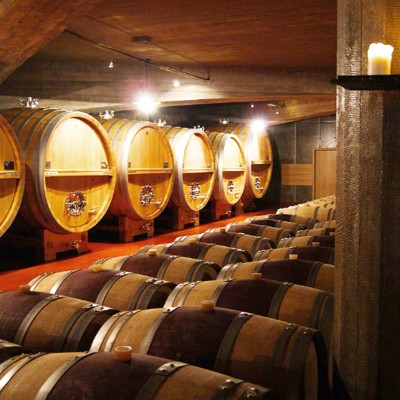
RHT-xx Digital relative humidity & temperature sensor instrument to monitorings of...
Product Describe The process of maturation of the wine bottles and barrels in cellars requires carefully protected climatic conditions that are stable over t...
View Detail -
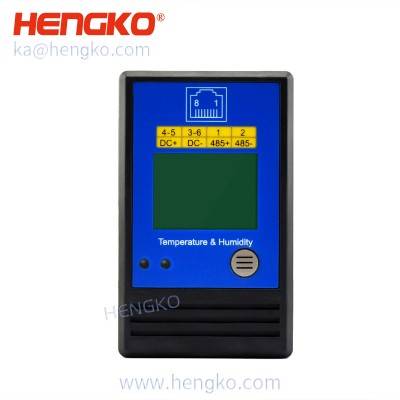
High precision RS485 wirreless humidity controller temperature transmitter refrigerator...
Product Describe HENGKO temperature humidity incubator controller designed using the latest high-speed microcontroller. It is widely applied in incubator box...
View Detail -
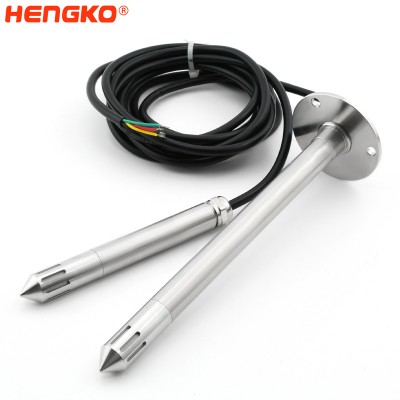
temperature and relative humidity sensor probe with stainless steel extension tube and ...
The HT-E067 relative humidity/ temperature transmitter provides a reliable and low-cost method for duct mount monitoring applications. Solid-state sensors pr...
View Detail -
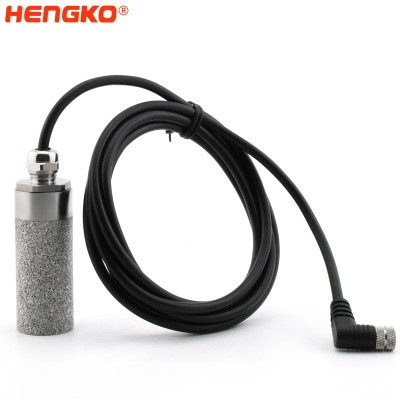
Corrosion-resistant IP65/IP66 housing used in compressed air systems
HENGKO temperature and humidity module adopt high precision RHT series sensor equipped with a sintered metal filter shell for large air permeability, fast ga...
View Detail -
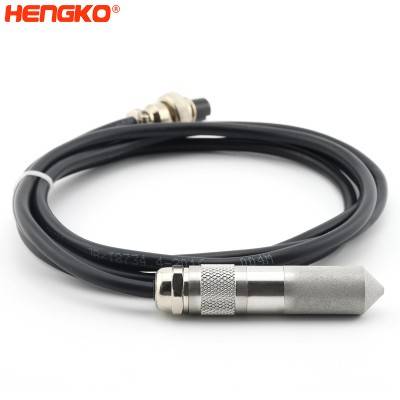
OEM I2C high precision air temperature and relative humidity sensor probe with stainles...
Temperature and relative humidity sensor probe HENGKO Humidity & Temperature Sensor is a fully-calibrated and temperature-compensated combined hum...
View Detail -
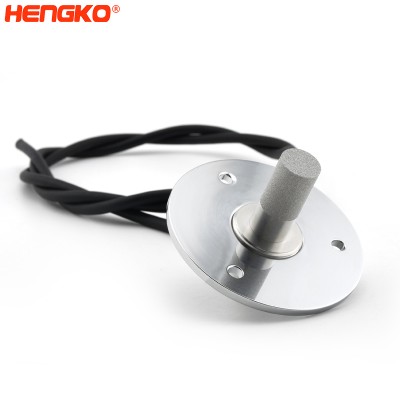
Flange Mounted digital waterproof high RHT-H serious I2C output temperature humidity se...
HENGKO IP67 Harsh Environment temperature and humidity probe is a fully-calibrated and temperature-compensated combined humidity and temperature sensor suppl...
View Detail -
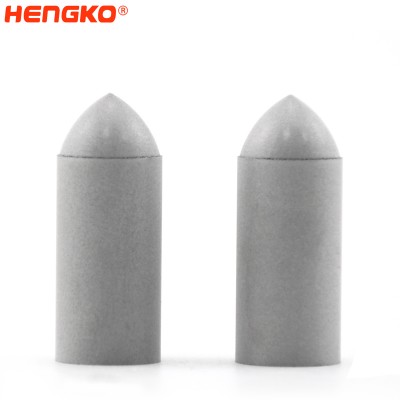
Dustproof Humidity Sensor Housing for Humidity Instruments
Typically the primary task of the humidity sensor housing - a sintered filter is to prevent dust from entering the sensor element. Although HENGKO humicap se...
View Detail -
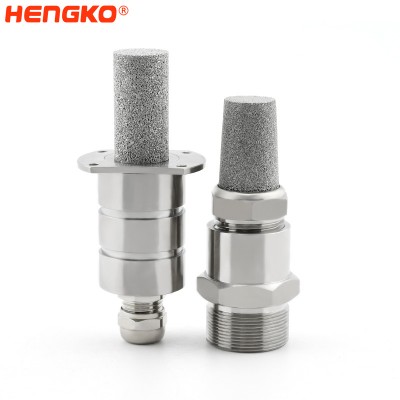
Explosion proof sintered porous relative humidity sensor housing, RHT30 RHT31 RHT40 hum...
HENGKO stainless steel sensor shells are made by sintering 316L powder material at high temperatures. They have been widely used in environmental protectio...
View Detail -
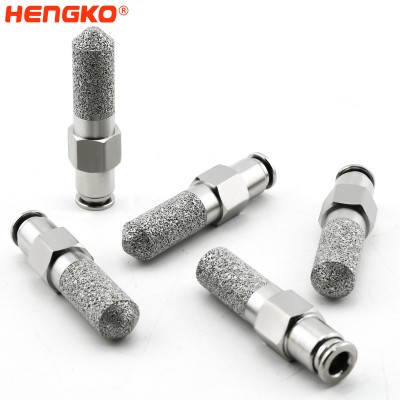
Weatherproof & Breathable Humidity and Temperature Sensor Probe Housing – St...
Product Description : The humidity probe includes a humidity sensor housing and an RHT humidity sensor. The humidity sensor housing is weatherproof and will ...
View Detail -
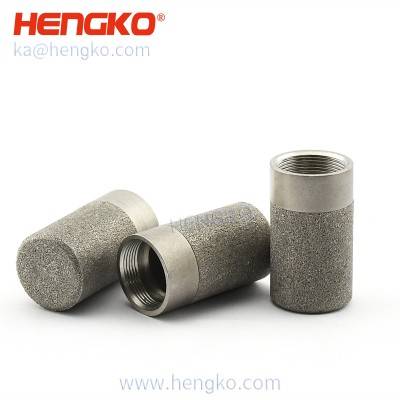
weather stations – HK36MCN I2c temperature humidity sensor housing,316L
HENGKO stainless steel humidity sensor housing is made by sintering 316L powder material at high temperatures. They have been widely used in environmental pr...
View Detail -
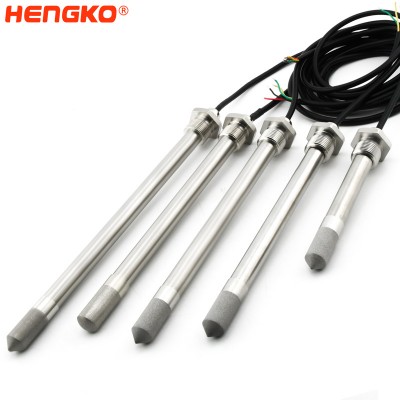
(0~100)% RHT3X split type digital temperature and humidity sensor metal stainless steel...
Take your next outdoor sensor project to the next level with this RHT-3x-based temperature/humidity sensor. The sensor includes a dual-use sensor module from...
View Detail -
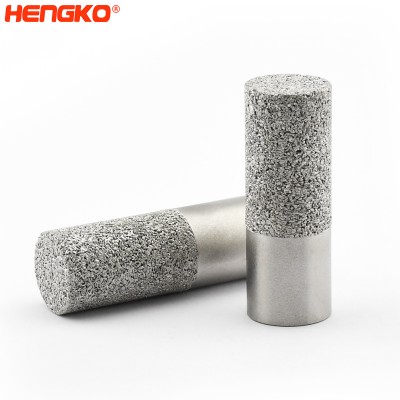
HK64MCN M6*1.0 digital temperature and humidity sensor housing,RHT20 RHT30 for incubato...
HENGKO stainless steel humidity sensor housing is made by sintering 316L powder material sintered filter at high temperatures. they are weatherproof and will...
View Detail -
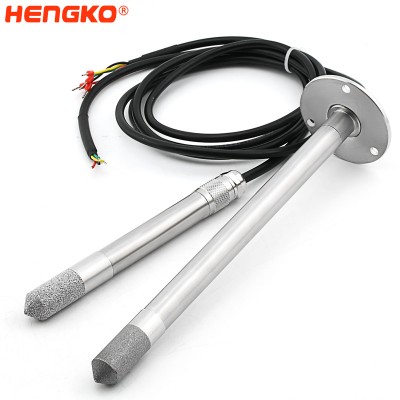
High Performance Industrial i2c humidity Sensor Probe
No matter new customer or previous client, We believe in prolonged time period and trustworthy relationship for High Performance China Industrial 4-20mA High...
View Detail -
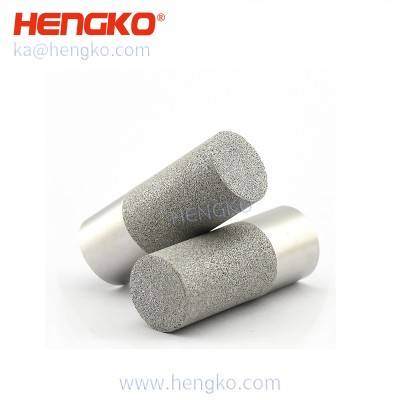
HK59MCN Resistant High strength temperature & humidity sensor shield protective co...
HENGKO porous metal humidity sensor housing is made by sintering 316L powder material at high temperatures. They have been widely used in environmental prote...
View Detail -
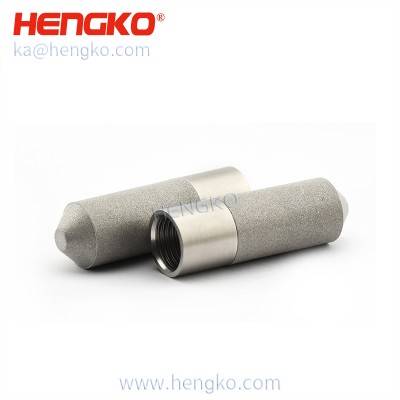
HK85U5/16N thread 5/16-32 IP67 temperature & humidity sensor, stainless steel humi...
HENGKO humidity sensor housing is made by sintering 316L powder material at high temperatures. They have been widely used in environmental protection, petrol...
View Detail
Why You Should Choose Industrial Temperature And Humidity Sensor
Here are some possible sentences for a blog post on why one should choose industrial temperature and humidity sensors:
1.) Industrial temperature and humidity sensors are essential tools for maintaining optimal conditions in various industrial settings, from agriculture to manufacturing and beyond.
2.) With industrial temperature and humidity sensors, you can improve productivity and safety by ensuring that environmental conditions are within the ideal range for your specific needs.
3.) These sensors offer highly accurate and reliable data, making it easier for you to identify potential issues and adjust as needed to ensure maximum efficiency.
4.) Industrial temperature and humidity sensors are highly customizable, allowing you to tailor them to your specific requirements, including size, material, and sensor type.
5.) With their durable construction and resistance to harsh environmental conditions, these sensors are built to withstand tough industrial environments and provide long-lasting service.
6.) Choosing an industrial temperature and humidity sensor from a trusted manufacturer like HENGKO can ensure that you have a reliable and effective tool for monitoring and controlling environmental conditions in your specific industry.
Main Feature of Industrial Temperature and Humidity Sensor
1. Highly Accurate Data:
An industrial temperature and humidity sensor provides precise and reliable measurements of temperature and humidity, ensuring that environments are within the ideal range for optimal performance and safety.
2. Durable Construction:
These sensors are built to withstand harsh industrial conditions, from extreme temperatures to dust, moisture, and other contaminants, ensuring that they provide long-lasting service for your specific needs.
3. Customization Options:
These sensors offer a wide range of customization options, including different sizes, materials, and sensor types, allowing them to be tailored to fit the specific requirements of your application.
4. Real-time Monitoring:
With real-time monitoring capabilities, industrial temperature and humidity sensors provide instant feedback, allowing you to quickly adjust environmental conditions as needed to maintain ideal performance levels and safety.
5. User-friendly Interfaces:
These sensors are designed with simple controls and user-friendly interfaces, making them easy to install, operate, and maintain.
6. Versatility:
Industrial temperature and humidity sensors can be used in various industries, including agriculture, manufacturing, healthcare, and many more, providing reliable solutions for monitoring and controlling environmental conditions in specific applications.
7. Remote Access:
Some sensors offer remote access capabilities, allowing you to monitor and control environmental conditions from a remote location, providing extra convenience and flexibility.
8. Compliance with Standards:
These sensors meet or exceed industry standards, ensuring that they are safe and effective for your specific application needs.
By using industrial temperature and humidity sensors with these features, you can ensure that you have a reliable and effective solution for monitoring and controlling environmental conditions in your specific industry.
Application of industrial temperature and humidity sensors
1. Agriculture:
Industrial temperature and humidity sensors can help monitor and adjust environmental conditions in greenhouses, crop storage, and other agriculture-related applications, helping to ensure maximum crop yield and quality.
2. Manufacturing:
These sensors can be used in manufacturing applications to monitor temperature and humidity levels in production areas, helping to reduce waste and improve product quality.
3. Healthcare:
Industrial temperature and humidity sensors can be used in medical equipment and storage applications to monitor and control temperature and humidity levels, ensuring the safe and effective storage of medicines, vaccines, and other healthcare products.
4. Food Industry:
Industrial temperature and humidity sensors can help monitor and control environmental conditions in food processing and storage facilities, preventing spoilage and maintaining optimal conditions for food safety.
5. Data Centers:
These sensors can be used to monitor temperature and humidity levels in data centers, helping to prevent equipment failures caused by overheating or excess humidity.
6. HVAC:
Industrial temperature and humidity sensors can help regulate heating, ventilation, and air conditioning (HVAC) systems, ensuring optimal environmental conditions for comfort and energy efficiency.
7. Green Energy:
These sensors can be applied in renewable energy applications, such as solar panels, wind turbines, and energy storage systems, to monitor environmental conditions and help maximize energy efficiency and output.
8. Pharmaceuticals:
Industrial temperature and humidity sensors can help maintain ideal conditions in pharmaceutical storage facilities, ensuring the safety and efficacy of drugs and medical equipment.
By using industrial temperature and humidity sensors in these applications, you can help increase productivity, reduce waste, and ensure safety and compliance in your specific industry or environment.
FAQ for Industrial Temperature and Humidity Sensor
1. What is an Industrial Temperature and Humidity Sensor?
An industrial temperature and humidity sensor is an electronic instrument designed to measure and monitor temperature and humidity levels in industrial settings. These sensors provide reliable data that helps ensure optimal environmental conditions for safety and productivity.
2. How Do Industrial Temperature and Humidity Sensors Work?
These sensors work by using various sensing elements such as thermistors, RTDs (Resistive Temperature Detectors), or capacitive sensors to measure temperature and humidity levels. They then send this data to a microcontroller, which processes it and provides output signals for display or control functions.
3. What Are the Benefits of Using Industrial Temperature and Humidity Sensors?
The benefits of using these sensors include improved safety and productivity, reduced waste, and ensured compliance with industry and regulatory standards. These sensors provide precise and reliable data that helps identify potential issues and maintain optimal environmental conditions for specific applications.
4. What Industries Use industrial Temperature and Humidity Sensors?
Industries that commonly use these sensors include agriculture, manufacturing, healthcare, food processing, data centers, and HVAC systems. These sensors provide reliable solutions for monitoring and controlling environmental conditions in these industries.
5. Can Industrial Temperature and Humidity Sensors be Customized?
Yes, these sensors can be customized to fit the specific requirements of your application. Customization options include various sizes, materials, and sensor types to ensure optimal performance in your specific environment.
6. What is the Lifespan of an Industrial Temperature and Humidity Sensor?
The lifespan of these sensors can vary depending on the specific model and environmental conditions. However, with proper installation, maintenance, and calibration, these sensors can provide long-lasting service for your specific needs.
7. How Can I Select the Right Industrial Temperature and Humidity Sensor for My Application?
Selecting the right sensor for your application requires careful consideration of your specific requirements, including the size, accuracy, durability, and cost of the sensor. It's important to consult with a trusted manufacturer like HENGKO to ensure you select the right sensor for your needs.
8. What is the Difference Between Indoor and Outdoor Temperature and Humidity Sensors?
Indoor temperature and humidity sensors are designed for use in controlled environments, while outdoor sensors are built to withstand harsh outdoor conditions. Outdoor sensors are typically more durable and resistant to extreme weather conditions.
9. Can Temperature and Humidity Sensors be used for Monitoring Air Quality?
While temperature and humidity sensors are not specifically designed for monitoring air quality, they can provide valuable data on factors that affect air quality, such as temperature, humidity, and carbon dioxide levels.
10. What is the Maximum Temperature Range for Industrial Temperature Sensors?
The maximum temperature range can vary depending on the specific model and application requirements. However, some industrial temperature sensors can measure temperatures up to 1000°C or more.
11. What is the Difference Between Thermocouples and RTDs?
Thermocouples are temperature sensors that measure temperature by using the voltage generated between two dissimilar metals. RTDs measure temperature by detecting changes in the resistance of a metal wire as its temperature changes.
12. What Are Some Common Humidity Sensor Technologies?
Humidity sensors use a variety of technologies to measure humidity levels, including capacitive, resistive, and thermal conductivity sensors.
13. Can Industrial Temperature and Humidity Sensors be Used for Remote Monitoring?
Yes, some temperature and humidity sensors can be used for remote monitoring. These sensors typically have wireless capabilities and can transmit data to a remote system for analysis and control.
14. How Do I Calibrate an Industrial Temperature and Humidity Sensor?
Calibration involves verifying the accuracy of the sensor and adjusting it accordingly. Calibration should be performed regularly to ensure that the sensor provides reliable and accurate data.
15. What is the Operating Temperature Range of Industrial Humidity Sensors?
The operating temperature range can vary depending on the specific model and application requirements. However, some industrial humidity sensors can operate in temperatures ranging from -40°C to 85°C.
16. How Do Industrial Temperature and Humidity Sensors Help Improve Energy Efficiency?
These sensors provide data that can be used to optimize HVAC systems and other equipment for energy efficiency. By maintaining optimal environmental conditions, energy consumption can be reduced, resulting in cost savings.
17. What Are the Environmental Benefits of Using Industrial Temperature and Humidity Sensors?
The environmental benefits of using these sensors include reduced energy consumption, minimized waste, and increased efficiency, which ultimately leads to a lower carbon footprint and a more sustainable industrial operation.
Contact HENGKO today to discover how our industrial temperature and humidity sensors can help
optimize your productivity, safety and energy efficiency while reducing waste and environmental impact.
Let us help you find the perfect solution for your specific application needs. Email us at ka@hengko.com
to request a quote or schedule a consultation with our team.
